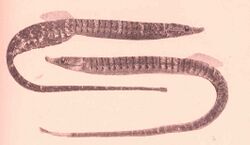Biology:Vanacampus vercoi
From HandWiki
Short description: Species of fish
| Verco's pipefish | |
|---|---|

| |
| Syngnathus vercoi | |
| Scientific classification | |
| Domain: | Eukaryota |
| Kingdom: | Animalia |
| Phylum: | Chordata |
| Class: | Actinopterygii |
| Order: | Syngnathiformes |
| Family: | Syngnathidae |
| Genus: | Vanacampus |
| Species: | V. vercoi
|
| Binomial name | |
| Vanacampus vercoi Waite & Hale 1921[2]
| |
Vanacampus vercoi, also known as Verco's pipefish, is a species of marine fish belonging to the family Syngnathidae.[2] They can be found inhabiting seaweed and seagrass beds in addition to tidepools at depths between 2–4 meters from Spencer's Gulf to Encounter Bay, South Australia.[3][4] Their diet likely consists of small crustaceans such as amphipods and copepods.[5] Reproduction occurs through ovoviviparity in which the males brood eggs before giving live birth.[6]
References
- ↑ Pollom, R. (2017). "Vanacampus vercoi". IUCN Red List of Threatened Species 2017: e.T155285A67619445. doi:10.2305/IUCN.UK.2017-3.RLTS.T155285A67619445.en. https://www.iucnredlist.org/species/155285/67619445. Retrieved 19 November 2021.
- ↑ 2.0 2.1 Pollom, R.. "Vanacampus vercoi". IUCN Red List of Threatened Species. https://www.iucnredlist.org/species/155285/67619445. Retrieved 22 May 2019.
- ↑ Pogonoski, J.J.; Pollard, D.A.; Paxton, J.R. (2002). Conservation overview and action plan for Australian threatened and potentially threatened marine and estuarine fishes. Australia: Environment Australia, Canberra, ACT.
- ↑ Baker, J.; Sheperd, S.; Brown, A.; Crawford, H.; Muirhead, D. (2008). Uncommon and Cryptic Reef Fishes: Results of Pilot Surveys along Fleurieu Peninsula. Adelaide and Mt Lofty Ranges Natural Resources Management Board.
- ↑ Kendrick, A.J.; Hyndes, G.A. (2005). "Variations in the dietary compositions of morphologically diverse syngnathid fishes". Environmental Biology 72 (4): 415–427. doi:10.1007/s10641-004-2597-y.
- ↑ Dawson, C.E. (1985). Indo-Pacific Pipefishes (Red Sea to the Americas). Ocean Springs, Mississippi, USA: The Gulf Coast Research Laboratory.
External links
- Vanacampus vercoi at FishBase
- Vanacampus vercoi at Fishes of Australia
 |


